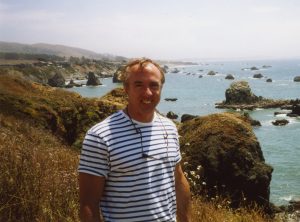This upcoming Pride weekend marks an important anniversary: on June 24th, it will be eleven years since the passing of Richard Weiland (1953-2006).
If you’re not familiar with Ric’s name, you’re not alone—even in his hometown of Seattle, many do not know the man who would become the architect of some of the most critical gains the LGBTQ movement has made over the last decade.
Ric was one of Microsoft’s first five employees and a Pride Foundation Board member. Upon his death, Ric left $65.5 million to 11 LGBTQ organizations—the largest single gift to the movement in history. Many of the most important advances our community has achieved have their roots in Ric’s generosity.
Given recent gains by the LGBTQ movement, it can be hard to appreciate Ric Weiland’s ambitious philanthropic vision. But when Ric passed away at the age of 53 in 2006, the LGBTQ movement was still in its infancy: there was no national marriage equality; “Don’t Ask Don’t Tell” was the military’s policy; and most LGBTQ people did not have legal protections in the workplace. Many of the larger LGBTQ organizations, including roughly half of those Ric supported, were still often powered by dedicated volunteers or overworked and underpaid staff.
The unparalleled and historic scale of Ric’s investment changed this.
In 2006, the year of his death, the national LGBTQ movement was supported by $65.5 million in foundation grants. His estate gift of $65.5 million essentially doubled, in symbolic terms, investment in LGBTQ equality.
Just a few highlights of what Ric’s bequest helped achieve show the scale of his impact:
- Marriage equality on the national level
- Pharmaceutical breakthroughs in the management of HIV and important research milestones on the path to a vaccine and cure
- The end of “Don’t Ask Don’t Tell”
- Non-discrimination policies in an expanding number of businesses and states
- UN Human Rights Council resolutions against discrimination on the basis of sexual orientation and gender identity
- The first UN Security Council briefing on LGBTIQ rights
- The largest LGBTQ college scholarship program in the country
Ric was a remarkable person on many levels. When he sold his first computer program while still in high school, he earned enough to pay for his first year at Stanford. After Stanford, he rejoined his high-school friends, Bill Gates and Paul Allen, to become Microsoft’s inaugural general manager and programmer. At 35, Ric retired from the company—walking away from Microsoft with $4 million. He grew that to more than $100 million and dedicated himself to philanthropy. He was a humble, out gay man who was HIV positive and deeply concerned about the welfare of our community.
According to his long-time partner Mike Schaefer, Ric was so humble that he rarely spoke about himself. “At dinner parties, he was the person who asked the questions,” said Mike. “He wouldn’t talk about himself.”
Ric was quiet and determined. Determined, through his legacy, to move the needle on LGBTQ equality.
“We didn’t see a lot of this progress coming in our lifetime,” said Schaefer. “He would be shocked to see the progress his gift spurred.”
Ric’s bequest provided key organizations—Pride Foundation, Lambda Legal Defense and Education Fund, AmfAR, GLAAD, GLSEN, Task Force/NGLTF, Project Inform, PFLAG, Outright International, OutServe, In the Life TV—with the funding and security they needed to become more nimble, powerful, and sustainable institutions, which, working together, pushed the movement to a historic tipping point.
Pride Foundation received nearly one third of these funds, and also managed Ric’s legacy investment and quarterly dispersals to each of the above organizations over the next ten years. The last dispersal of funds was issued this past December.
With Ric’s unrestricted funding, these organizations had unprecedented financial stability for nearly a decade, allowing them to increase their impact, irrespective of the larger economy and the Great Recession. For most of the beneficiaries, Ric’s bequest was and remains the largest donation in their history.
Ric methodically structured his legacy to strategically lift the LGBTQ movement in the exact areas that needed it most—law, policy, education, health services, media, and culture. This tactical approach ensured that his gift would total more than the sum of its parts—that the bolstered organizations could, together, have a catalytic effect across a full range of issues. The resulting outsized impact includes resilient organizations that continue to serve as pillars within a more robust, cohesive, and sustainable movement.
“Ric really trusted the organizations he supported,” said Kris Hermanns, CEO of Pride Foundation. “He did his research and was confident in the abilities of the organizations he chose to support…”He saw that we were at the cusp of something great. I’m not sure he could have anticipated the enormity of that. And so I think he would be incredibly, graciously surprised. The extent of the changes, the depth of the changes, and the pace of the changes happened more quickly than he could have anticipated.”
But if he were around, she says, “I sure hope he’d be proud.”
Greg Mullins is a Pride Foundation Board Member
